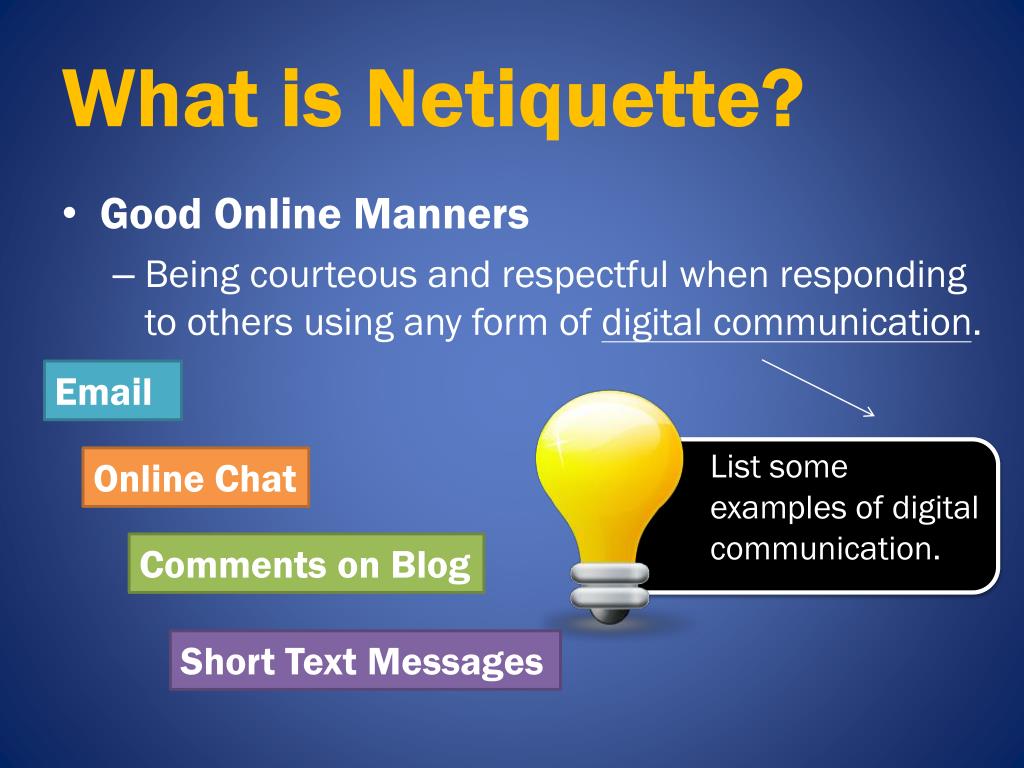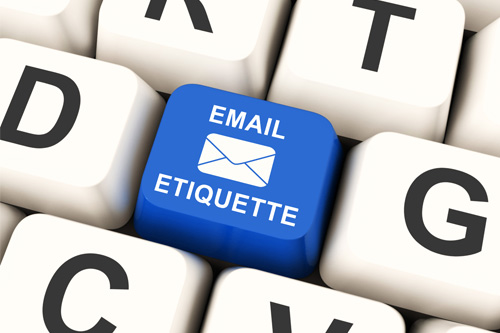

#Email netiquette code#
Unprofessional email behavior has the potential to sabotage your reputation.Įmail etiquette refers to the code of conduct that guides one’s behavior while writing and/or answering emails. Many of us may have, at some point or another, made embarrassing mistakes that have damaging consequences. Many of us send and receive a lot of emails every day. Over the years, we’ve become almost completely reliant on internet-based communication-electronic mails or emails are among the most popular. What Is Email Etiquette And Why Is It Important? These are some of the benefits of using proper email etiquette.

How do you make your recipient take notice in a cluttered inbox? You’ll use a captivating subject line and convey your message in a compact manner. We’re being ambushed by unwanted promotions and marketing emails all the time.
#Email netiquette full#
What do you see? Hundreds of unread messages, right? Most of our inboxes are full of unread emails, random advertisements and sales information. Be sure any deadlines you set are realistic.Take a moment to look at your inbox. If you’ve got a concern or a grumble – do you need to include anyone else other than the person you really need to tell? Likewise if you are e-mailing tasks and there are many ‘to do’s’ involved, pick up the phone and alert people. ) Use email responsiblyĭon’t be a cyber bully. For this simply substitute the colon for a semi-colon. A ‘winking smiley’ is often used after someone makes a wry joke and wants to be certain that the reader ‘hears’ the ironic tone. created by typing a colon followed by a dash and a bracket. The most commonly used emoticon is the ‘smiley’. In emails we cannot pick up facial expressions or tone of voice, so these icons can provide important information about your exact meaning. You may think them unnecessary or silly, but they have a valid purpose.

Instead, use ‘emoticons’, the icons that express emotions. It’s very common to be misunderstood when using humour or irony, some readers may not get the joke. I said that we should all go to *meeting room 1* for this discussion Be cautious with humour I said that we should *all* go to meeting room 1 for this discussion. *I* said that we should all go to meeting room 1 for this discussion. To emphasise, use an asterisk (*) before and after the word you want to stress. Using capitals is the equivalent of SHOUTING on line. Try to resolve these quickly and with courtesy. Not everyone has an equal understanding of email technology, or perhaps the topic being discussed, so there may be occasional misunderstandings. If you feel that the behaviour is not a one-off or if it falls into the realm of racism, sexism or is threatening, alert your line manager or consult a confidential contact as appropriate. If you are offended by something online, express your feelings calmly to the appropriate person - preferably by private email, not by ‘reply all’. Try to ignore others’ attempts to antagonise. Instead, email an alternative perspective. Personal attacks inhibit communication by raising everyone’s defences. So, in response, never criticise the sender online. Don’t turn a ‘flame’ into a forest fire.Ī ‘flame’ is email content that takes a particularly nasty, mean-spirited tone. Offensive language is contrary to the code of behaviour. Never - and that does mean never - use words that could be considered sexist, racist or ageist, or express a social viewpoint that could be regarded as insensitive, prejudiced or biased – and therefore disrespectful. Never use text speak – such as, IMHO (In My Humble Opinion) or FWIW (For What It’s Worth).

So always provide a brief description of unfamiliar terms. Not everyone reading your email will be familiar with NHS jargon or even words that are local to your area. If the message needs a lot of detail, perhaps email is not the best way to communicate it. Be clear and conciseĮmails should be easy to understand, so avoid too much background information. Take a few momments to profread before you sned something! Frequent typographical errors or misspellings will distract readers and can leave a bad impression. People don’t turn off their feelings when they turn on their computer. If you wouldn’t say something to a person face to face, then you shouldn’t write it in an email. Never send an email you wouldn’t like to receive yourself.


 0 kommentar(er)
0 kommentar(er)
